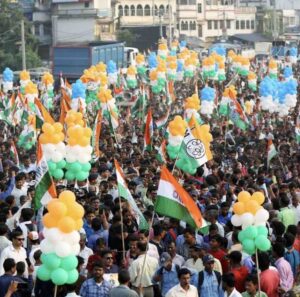Have you seen the Hindi movie Newton, released in 2017?
It portrays the character of a polling officer, played by Rajkummar Rao, who endeavored to conduct a free and fair election in a remote village in India against all odds.
This is one of the very few movies in Indian cinema that shows the role of elections in making Indian democracy. There is a scene in the movie where polling officers have to take a helicopter ride to reach their polling location.
If you think it is a hyperbole of a Hindi movie, it is not; the Indian Election Commission recently posted a picture on its social media account showing Elephants, Horses, Boats, and Helicopters being used as means of transport by polling officials and security staff.
Indian elections are one of the largest democratic exercises in the world, given the vast size and diversity of the country’s population. Conducting these elections in India is a mammoth task, and various transport options, including helicopters, are used to reach the nook and corner of the country.
A Short Primer on Indian Elections –
The responsibility for administering elections in India lies with the Election Commission of India (ECI), an autonomous constitutional authority established in 1950 shortly after India gained independence. ECI conducts elections to the Lok Sabha, Rajya Sabha, state legislative assemblies, and the offices of the President and Vice President of India.
ECI ensures free and fair elections by implementing strict rules and regulations, monitoring campaign spending, and deploying security forces to maintain law and order.
Lok Sabha elections are held in India every five years to elect members of the lower house of the Parliament of India.
This year will mark the elections to the 18th Lok Sabha, where elections will be held in 543 constituencies across India. As per the date announced by the Election Commission of India, the elections will be conducted in seven phases from 19 April 2024 to 1 June 2024.
As mentioned earlier, conducting elections in India is a massive exercise. According to the data provided by ECI, this year, 970 million voters, 15 million polling officials, and over a million polling stations will be involved.
Apart from the resources involved in conducting the elections, significant effort goes into election campaigning by various political parties. The campaigning is highly spirited and often involves massive rallies, roadshows, speeches, and advertising across diverse media platforms. Political parties deploy various strategies to reach voters, including social media campaigns, door-to-door canvassing, and public meetings.
These campaigns involve posters with campaign messages, large cutouts of leaders, pamphlets, leaflets, banners, balloons, and flags of political parties, not to overlook the intensive use of energy for light and transportation.


As you can imagine, single-use campaign materials inevitably end up in landfills, polluting our environment and surroundings.
What is the Solution?
For the first time in Indian election history, the Election Commission of India has indicated that it will make the elections sustainable. Focus has been made on managing waste and reducing carbon footprint.
To manage waste, ECI has directed the complete avoidance of single-use plastic, including providing separate collection bins with proper signage, adequate disposal facilities for each type of waste, and forming partnerships with local waste management facilities.
In addition to waste management, for sustainable Indian elections, ECI has also suggested minimizing the use of paper, which is massive in these elections.
The Indian elections involve creating multiple voter lists, which polling officers hold to cross-check voters’ names and record their attendance. Apart from the voter list held by polling officers, the political parties involved in the election also have their copies. Given that the names of 970 million Indian citizens are involved, the use of paper to create multiple voter lists can run into millions of sheets.
To lower paper usage, emphasis is being placed on using electronic modes of communication, including eBooks and eDocuments. Where printing paper is unavoidable, ECI has suggested ensuring double-side printing and print layout optimization.
Finally, to reduce the carbon footprint emanating from various transport facilities, ECI wishes to promote eco-friendly vehicles, such as electric vehicles, and encourage carpooling and public transport facilities. It has also encouraged the leverage of renewable energy in campaign events.
Wrapping Up
Overall, Indian elections are complex, vibrant, and crucial exercises in the functioning of the world’s largest democracy. Efforts to reduce waste, energy consumption, and carbon emissions associated with electoral activities can add another positive dimension to its glorious history.
Since the early 2000s, India has been one of the few large democracies widely adopting electronic voting machines to conduct elections. The automated voting machine led to the complete elimination of traditional paper ballots, leading to massive paper savings.
While the steps suggested by the Election Commission of India for the 2024 elections to reduce the environmental impact might be minuscule, and many of the suggestions will not be implemented or ignored by political parties, it is a step in the right direction.
According to reports, 2024 will be the year of Elections, with half of the world’s population going to the polls. Therefore, any effort to have sustainable Indian elections will not only inspire other countries but will also contribute to broader sustainability goals and demonstrate responsible stewardship of resources.






Add comment